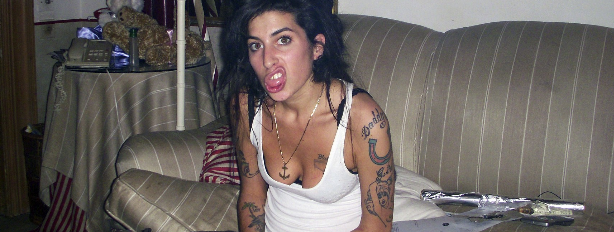Watching Amy, it sometimes feels like I'm the only one who finds self-destruction boring as hell. Even back when Amy Winehouse released the single for "Rehab" to such acclaim in 2006, it didn't take a genius to see which direction she was headed, and it sounded to me like yet another self-involved artist romanticizing their own suicidal bent. "Ooh, how rebellious," we coo, so long as it isn't us burning our lives out with drink and drugs.
I don't mean to suggest that I wished anything bad on her when she was alive, or that her death was anything but a tragedy that came far too soon. But Amy, the documentary from the same team led by director Asif Kapadia that produced Senna, feels ghoulish and exploitative; one last swipe to take home our own little chunk of her memory.
This isn't quite the same exploitation that we saw in Finding Vivian Maier, though. Maier studiously avoided publicity her entire life; Winehouse at least claims to have hated the limelight, but I'm never sure how much to trust the line "I hate being a public figure" when delivered in the middle of a nationally televised interview. Even if she did truly hate publicity, she wanted her singing to be known.
Whatever her actual feelings on it, much of the archival footage Kapadia uses shows her being hounded by paparazzi. And sure, that's an important part of her story, but we can't exactly separate out the fact that the footage inserted into the documentary was itself shot by paparazzi. We're caught in a bind: clearly we're meant to boo and hiss these awful publicity-hounds causing so much trouble for this fragile young lady, but we can only do so because of the very people we're called to despise. They wouldn't even be after her if we weren't such gluttons for a piece of Winehouse's life.
To be clear, the audience aren't the worst actors here. Kapadia gathers interviews with Winehouse's family and friends, and it seems that everyone around her was awful, ignoring one red light after another on the way to her grave. Many of them had an incentive to look the other way, or even to enable Winehouse's self-destructive tendencies; her father was the one who originally kept her out of rehab lest his gravy train stop. But some of it is only attributable to sheer stupidity; A preteen Amy tells her mother about her fab new diet where she eats whatever she wants before puking it all up, and her mother's only reaction is to muse that, "it's kind of similar to bulimia, isn't it?"
Or maybe it's not. Remember, Kapadia's the one in the editing bay splicing together these interviews with old press footage, concert recordings -- subtitled in a cute swirly typeface to cover up the fact that Winehouse's Billie Holiday impression swallows half of every word she sings -- and awful old home videos that shake more than a Paul Greengrass movie. He's the one whose camera slowly leers at every shot of Winehouse looking her absolute worst. He's counting on us to be so dazzled by our adoration of her stardom that we never question whether what he shows us is true. Is it? I don't really know, but the fact that it fits into such a standard storyline makes me suspicious.
Whether or not it is the truth, what do we stand to gain from Winehouse's story, beyond gawking while condemning all the other gawkers around us? She's no David Foster Wallace, who went down swinging against his demons, and left behind some of the most finely observed meditations on addiction, depression, and the human condition. Winehouse's songs -- her singing voice aside -- are self-indulgent teenage doggerel, and she embraced her downfall with reckless abandon. There's simply nothing here to gain but another grisly wreck to stare at in our rear-view mirrors.
Rating: 1 out of 5















